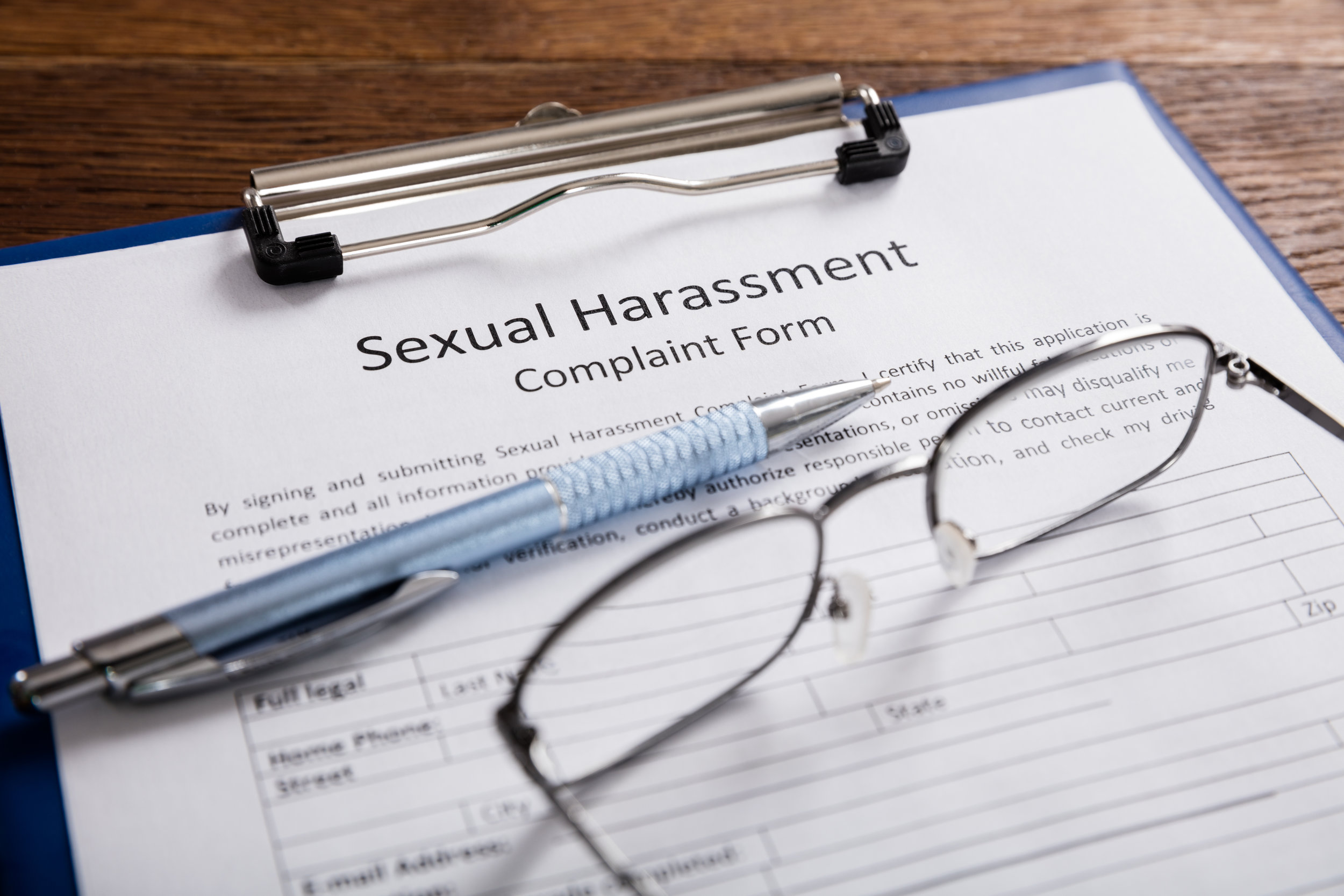
Industry News

Employers Prepare As Reports of Sexual Harassment Spike
Author, Alyssa Burley, Media Communications and Client Services Manager, Rancho Mesa Insurance Services, Inc.
Americans are all too familiar with the #MeToo movement that has shed light on sexual harassment in the workplace. Outspoken celebrities and prominent public figures have brought this topic to the forefront in the media. With all the publicity surrounding sexual harassment allegations, people are empowered to speak out and report unwanted behaviors in the workplace. This leaves many employers asking what they can do to prevent harassment and prepare for possible harassment allegations.
Editor’s Note: This article was originally published on June 27, 2019 and has been updated for accuracy on September 12, 2019.
Author, Alyssa Burley, Media Communications and Client Services Manager, Rancho Mesa Insurance Services, Inc.
Americans are all too familiar with the #MeToo movement that has shed light on sexual harassment in the workplace. Outspoken celebrities and prominent public figures have brought this topic to the forefront in the media. With all the publicity surrounding sexual harassment allegations, people are empowered to speak out and report unwanted behaviors in the workplace. This leaves many employers asking what they can do to prevent harassment and prepare for possible harassment allegations.
Charges Alleging Sexual Harassment FY 2010 - FY 2018
- Reports
- Reports
The United States Equal Employment Opportunity Commission (EEOC) released its “Charges Alleging Sexual Harassment FY 2010 - FY 2018” report. The data shows from 2010 to 2017 reports of alleged sexual harassment incidents actually declined 15.7%, over the seven-year span. However, based on the data, it is difficult to know if incidents of sexual harassment declined or just the reporting of incidents declined.
However, during 2018 there was an increase of 13.6% in alleged sexual harassment incidents, which accounted for over 7,600 claims at a cost of $56.6 million dollars in damages.
| Year | 2010 | 2011 | 2012 | 2013 | 2014 | 2015 | 2016 | 2017 | 2018 |
|---|---|---|---|---|---|---|---|---|---|
| Percentage Change Over Previous Year Number of Charges |
NA 7,944 |
-1.4% 7,809 |
-3% 7,571 |
-4.2% 7,256 |
-5.7% 6,862 |
-0.6% 6,822 |
-0.9% 6,758 |
-0.9% 6,696 |
13.6% 7,609 |
| Percentage Change Over Previous Year Damages (In Millions) |
NA $41.2 |
9.5% $45.1 |
-4.7% $43 |
3.7% $44.6 |
-21.5% $35 |
31.4% $46 |
-11.5% $40.7 |
13.8% $46.3 |
22.2% $56.6 |
EEOC. Charges Alleging Sexual Harassment FY 2010 - FY 2018. https://www.eeoc.gov/eeoc/statistics/enforcement/sexual_harassment_new.cfm.
California’s Senate Bill 1343 (SB 1343) now requires employers with 5 or more employees to provide 2-hour Anti-Harassment training to supervisors and 1-hour training to employees, every two years. As part of this new requirement, the initial training must be completed for all employees and supervisors by January 1, 2021, according to Senate Bill 778, approved on August 30, 2019, which extends the training due date. The changes made by SB 778 not only extends the due date to January 1, 2021, but also addresses concerns about supervisory employees and clarifies when temporary workers must be trained. Read about the changes here.
It’s our belief that as more people are trained to recognize harassment in its many forms, we expect to see the number of reported alleged harassment incidents increase in the coming years. So, what should California employers do to mitigate this increased risk?
Course of Action
For employers, the best course of action is two-fold. Make sure you are compliant by training your employees and supervisors; second, make sure you have Employment Practices Liability Insurance (EPLI) as part of your risk management portfolio.
Training Supervisors and Employees
Understanding the confusion, time and financial burden SB 1343 puts on all California employers, Rancho Mesa offers its clients SB 1343-compliant free online supervisor and employee Anti-Harassment training. Supervisor and employee trainings can be completed 100% online via a computer, tablet or mobile device.
California employers who are not clients of Rancho Mesa can find this training through 3rd party vendors that work in the Human Resource arena and will need to contract with them directly to meet this requirement.
Employment Practices Liability Insurance (EPLI)
EPLI is “a type of liability insurance covering wrongful acts arising from the employment process. The most frequent types of claims covered under such policies include: wrongful termination, discrimination, sexual harassment, and retaliation,” according to the International Risk Management Institute, Inc.
If your organization currently does not have EPLI, or you are unsure about what is covered in your policy, we recommend you contact your insurance broker or call us to get clarification. With the projected increase in these types of claims, not having this vital coverage in place could expose your company to severe negative financial impacts.
Whether the increase in reported alleged sexual harassment incidents is a result of more incidents or simply more people feeling comfortable reporting the harassment, every employer should be prepared to properly train their employees and supervisors, while actively working to prevent and stop all forms of harassment in the workplace.
Contact the Rancho Mesa Insurance Services Client Services Department at (619) 438-6869 or aburley@ranchomesa.com for more information about free anti-harassment training for supervisors and employees, or learn more through our other articles on the topic.
Alyssa Burley is NOT a licensed insurance professional. Informational statements regarding insurance coverage are for general description purposes only. Contact a licensed insurance professional for specific questions.
Ensuring CA Sexual Harassment and Abusive Conduct Training is SB 1343 Compliant
Author, Alyssa Burley, Client Services Coordinator, Rancho Mesa Insurance Services, Inc.
In September 2018, former California Governor Jerry Brown approved Senate Bill 1343 (SB 1343) which expanded the requirements for Sexual Harassment and Abusive Conduct Prevention training within California workplaces.
In order for the Sexual Harassment and Abusive Conduct Prevention training to be compliant, it must meet the following requirements. The training must:
Editor’s Note: This article was originally published on February 7, 2019 and has been updated for accuracy on September 12, 2019.
Author, Alyssa Burley, Client Services Coordinator, Rancho Mesa Insurance Services, Inc.
In September 2018, former California Governor Jerry Brown approved Senate Bill 1343 (SB 1343) which expanded the requirements for Sexual Harassment and Abusive Conduct Prevention training within California workplaces.
“An employer who employs 5 or more employees, including temporary or seasonal employees, [is required] to provide at least 2 hours of sexual harassment training to all supervisory employees and at least one hour of sexual harassment training to all nonsupervisory employees by January 1, 2020, and once every 2 years thereafter, as specified,” according to SB 1343.
On August 30, 2019, approved Senate Bill 778 extends the training deadline set in Senate Bill 1343 from January 1, 2020 to January 1, 2021. The changes made by SB 778 not only extends the due date to January 1, 2021, but also addresses concerns about supervisory employees and clarifies when temporary workers must be trained. Read about these changes here.
Ensuring the Training is in Compliance
In order for the Sexual Harassment and Abusive Conduct Prevention training to be compliant, it must meet the following requirements. The training must:
Be administered in a classroom setting, through interactive E-learning, or through a live webinar. E-learning training must provide instructions on how to contact a trainer who can answer questions within two business days.
Be conducted by an eligible trainer:
Attorneys who have been members of the bar of any state for at least two years and whose practice includes employment law under the Fair Employment and Housing Act or Title VII of the federal Civil Rights Act of 1964;
Human resource professionals or harassment prevention consultants with at least two years of practical experience in:
Designing or conducting training on discrimination, retaliation, and sexual harassment prevention;
Responding to sexual harassment or other discrimination complaints;
Investigating sexual harassment complaints; or
Advising employers or employees about discrimination, retaliation, and sexual harassment prevention.
Law school, college, or university instructors with a post-graduate degree or California teaching credential and either 20 hours of instruction about employment law under the FEHA or Title VII.
Explain the following topics:
The definition of sexual harassment under the Fair Employment and Housing Act and Title VII of the federal Civil Rights Act of 1964;
The statutes and case-law prohibiting and preventing sexual harassment;
The types of conduct that can be sexual harassment;
The remedies available for victims of sexual harassment;
Strategies to prevent sexual harassment;
Supervisors’ obligation to report harassment;
Practical examples of harassment;
The limited confidentiality of the complaint process;
Resources for victims of sexual harassment, including to whom they should report it;
How employers must correct harassing behavior;
What to do if a supervisor is personally accused of harassment;
The elements of an effective anti-harassment policy and how to use it;
“Abusive conduct” under Government Code section 12950.1, subdivision (g)(2).
Discuss harassment based on gender identity, gender expression, and sexual orientation, which shall include practical examples inclusive of harassment based on gender identity, gender expression, and sexual orientation.
Include questions that assess learning, skill-building activities to assess understanding and application of content, and hypothetical scenarios about harassment with discussion questions.
SB 1343 compliant trainings will be made available later this year via the California Department of Fair Employment and Housing (DFEH) website. However, employers can hire eligible qualified trainers to conduct the trainings at their convenience.
The DFEH has made available a sexual harassment and abusive conduct prevention toolkit, that includes a sample Sexual Harassment and Abusive Conduct Prevention training, certificate of completion and other resources for employers to use in conjunction with an eligible trainer.
Other training options include the online Anti-Harassment training Rancho Mesa offers to all of its clients’ supervisors and employees throughout the country in response to California’s Senate Bill 1343 (SB 1343) and Senate Bill 1300 (SB 1300).
For questions about this training requirement or to learn how to enroll your supervisors and employees, register for the “How to Enroll Supervisors and Employees in the Online Anti-Harassment Training” webinar or contact Rancho Mesa’s Client Services Department at (619) 438-6869.
Rancho Mesa Insurance will continue to monitor training options as they become available.
California SB 1343 Expands Sexual Harassment and Abusive Conduct Prevention Training Requirements
Author, Alyssa Burley, Client Services Coordinator, Rancho Mesa Insurance Services, Inc.
In September 2018, former California Governor Jerry Brown approved Senate Bill 1343 (SB 1343) which expands the requirements for Sexual Harassment and Abusive Conduct Prevention training within the workplace.
Editor’s Note: This article was originally published on January 17, 2019 and has been updated for accuracy on September 12, 2019.
Author, Alyssa Burley, Client Services Coordinator, Rancho Mesa Insurance Services, Inc.
In September 2018, former California Governor Jerry Brown approved Senate Bill 1343 (SB 1343) which expands the requirements for Sexual Harassment and Abusive Conduct Prevention training within the workplace.
New Requirements
Prior to SB 1343, California Assembly Bill 1825, Assembly Bill 2053, and State Bill 396, required employers with 50 or more employees to provide supervisors with sexual harassment and abusive conduct prevention training every two years. SB 1343 drops the minimum number of employees to 5 and adds a requirement for training nonsupervisory employees.
According to Senate Bill 778, passed on August 30, 2019 which expands the training deadline, “By January 1, 2021, an employer having five or more employees shall provide at least two hours of classroom or other effective interactive training and education regarding sexual harassment to all supervisory employees and at least one hour of classroom or other effective interactive training and education regarding sexual harassment to all nonsupervisory employees in California. Thereafter, each employer covered by this section shall provide sexual harassment training and education to each employee in California once every two years.”
The changes made by SB 778 not only extends the due date to January 1, 2021, but also addresses concerns about supervisory employees and clarifies when temporary workers must be trained. Read about the changes here.
Providing Training
The bills also requires the California Department of Fair Employment and Housing (DFEH), “develop or obtain two online training courses on the prevention of sexual harassment in the workplace. The course for nonsupervisory employees shall be one hour in length and the course for supervisory employees shall be two hours in length.” The department “expects to have such trainings available by late 2019,” according to a document provided by the DFEH. The online trainings are expected to be free for employers.
“In the interim period, DFEH is offering a sexual harassment and abusive conduct prevention toolkit, including a sample sexual harassment and abusive conduct prevention training. Employers may use the training in conjunction with an eligible trainer to provide sexual harassment and abusive conduct prevention training,” according to the DFEH.
An eligible trainer qualified to conduct this training would be:
Attorneys who have been members of the bar of any state for at least two years and whose practice includes employment law under the Fair Employment and Housing Act or Title VII of the federal Civil Rights Act of 1964;
Human resource professionals or harassment prevention consultants with at least two years of practical experience in:
Designing or conducting training on discrimination, retaliation, and sexual harassment prevention;
Responding to sexual harassment or other discrimination complaints;
Investigating sexual harassment complaints; or
Advising employers or employees about discrimination, retaliation, and sexual harassment prevention.
Law school, college, or university instructors with a post-graduate degree or California teaching credential and either 20 hours of instruction about employment law under the FEHA or Title VII.
Note, DFEH does not issue licenses nor certificates validating a person’s qualifications to teach sexual harassment prevention training classes.
Other training options include the online Anti-Harassment training Rancho Mesa offers to all of its clients’ supervisors and employees throughout the country in response to California’s Senate Bill 1343 (SB 1343) and Senate Bill 1300 (SB 1300).
We also can recommend Equal Parts Consulting to provide in-person supervisor and/or employee training to those in San Diego and Orange Counties. To receive a discounted rate, please let them know you are a Rancho Mesa Insurance client.
Rancho Mesa Insurance will continue to monitor training options as they become available.
For questions about this training requirement or to learn how to enroll your supervisors and employees, register for the “How to Enroll Supervisors and Employees in the Online Anti-Harassment Training” webinar or contact Rancho Mesa’s Client Services Department at (619) 438-6869.
Resources
California Department of Fair Employment and Housing. "Sexual Harassment and Abusive Conduct Prevenetion Training Information for Employers.”
https://www.dfeh.ca.gov/wp-content/uploads/sites/32/2018/12/SB_1343_FAQs.pdf
California Department of Fair Employment and Housing. “Sexual Harassment FAQs.”
https://www.dfeh.ca.gov/resources/frequently-asked-questions/employment-faqs/sexual-harassment-faqs/



